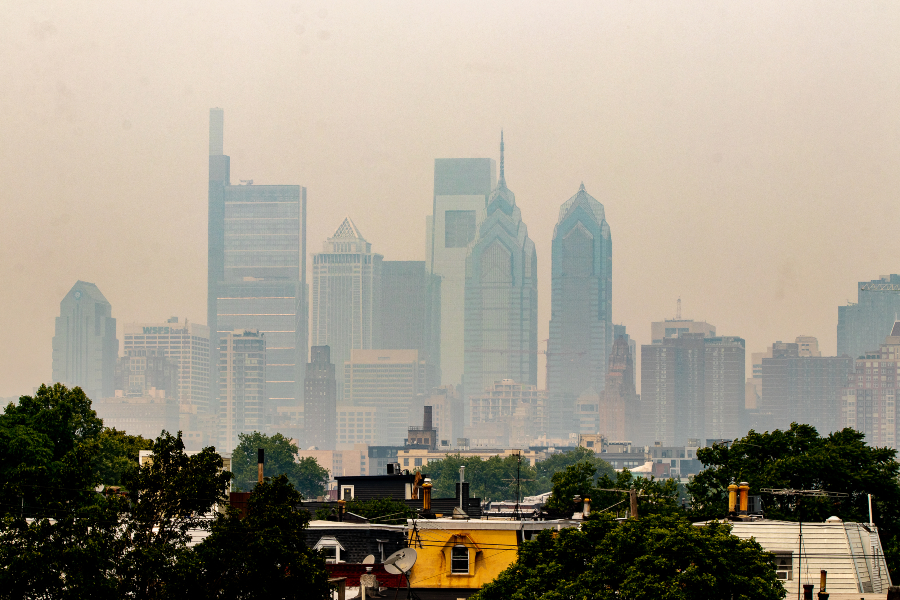How to Take Care of Your Lungs After Breathing Super-Polluted Air
Here’s what to do to support your respiratory health and general wellness amid tons of smoke from recent wildfires and the I-95 collapse.

A very hazy skyline as a result of smoke from Canadian wildfires. / Photograph by Albert Lee
Over the past several days, we’ve seen more than our fair share of apocalyptic pictures of Philadelphia — from a super hazy skyline to an entire chunk of I-95 crumbled to the ground. With the Canadian wildfires and the I-95 collapse came immense smoke that polluted our air to unhealthy levels — even reaching over 400 (300+ is considered hazardous).
Breathing hazardous air — including smoke from wildfires and tanker-truck fires — can have negative impacts on your health, especially your respiratory system. “With the type of smoke exposure we are seeing, we worry mostly about short-term impacts, including respiratory irritation that can cause cough and shortness of breath and can trigger asthma attacks, particularly among people with chronic underlying lung or heart problems,” says Philadelphia health commissioner Cheryl Bettigole. “But with the impact of climate change causing a substantial increase in forest fires, we are also concerned that exposure to multiple such events poses a risk of longer term impacts including chronic lung disease, heart disease and cancer.”
To support your lungs, heart, and overall wellness amid ongoing poor air quality, find local experts’ recommendations for better breathing and clearer sinuses below.
Reducing exposure
Philly’s Department of Public Health recommends the following for all area residents:
- Close all windows and doors to minimize air pollution in your home.
- Recirculate air with fans to avoid bringing more air pollution into your home.
- Avoid areas of high congestion and where air pollution may be high, like main streets or highways, and areas with low circulation.
If we’re being honest, though, the final recommendation isn’t super practical for those living and/or working in a city like Philadelphia. If you’re outdoors when air quality is unhealthy — and especially if you’re pregnant, live with lung or heart disease, or are a child or older adult — officials encourage you to wear a high-quality mask, like a KN-95. Philly residents can get free KN-95s at all Philadelphia police and fire stations, any of the Health Department’s five resource hubs, and the Black Doctors Consortium.
You might also want to invest in an air purifier for your home, as it can help eliminate microbes that contribute to respiratory issues, asthma and allergies, among other benefits.
Clearing sinuses
Audreesh Banerjee, doctor of pulmonary medicine and clinical director of the Asthma Program at Penn Medicine, says that some of his patients have noticed a “lingering smell even when they had come inside from the smoke,” likely because “the fine particles they are being exposed to from the smoke can stick to their clothes, hair and skin.” Banerjee suggests using a saline spray or Neti-Pot to help rinse your sinuses can help.
Using food as medicine
Taahirah and Nakia Stith, founders of Best of Philly-winning herbal apothecary Dope Botanicals, formulated a “Take Care” tea blend made from herbs — hyssop, anise hyssop, borage and rose — that specifically address the respiratory system. “Hyssop and anise hyssop may relieve spasms in the respiratory system, soothe coughs, and act as an expectorant to clear phlegm,” the sisters say. “Borage may help decrease swelling and inflammation in the lungs and airways, while rose may soothe sore throats and coughs, and reduce stress and anxiety.” They recommend enjoying the blend in hot or iced tea to support your sinuses, throat and lungs “whether it’s the ‘smokepocalypse,’ asthma, seasonal changes, or exposure from everyday environmental toxins.”
Olivia Amitrano, founder of viral herbal medicine brand Organic Olivia, turns to these good-for-the-lungs ingredients:
- Garlic. Studies have found that people who consume raw garlic on a regular basis see a decreased risk of developing lung cancer and might even live longer.
- Apples. “Not only are apples extremely moistening, but they nourish lungs and combat the extremely dry nature of smoke. The flavonoids within apples, especially khellin, can help open up your airways,” she says.
- Mullein. Herbalists have long loved mullein for soothing the lungs, aiding coughs, and helping the lungs recover after being exposed to smoke, according to Amitrano. “It is a mild relaxant to the lungs and also a mild demulcent, meaning it moistens and soothes the mucous membranes.” She suggests putting mullein in hot tea to help with inflammation and dryness.
Banerjee adds that staying hydrated and avoiding foods that can cause reflux — like fried foods, fatty meats, excessive alcohol and caffeine — can help you avoid exacerbating a cough or sore throat, and allow your body to be less vulnerable to infection.
Navigating terrible allergies alongside smoke inhalation
“Studies that have looked at the effects of wildfire smoke are somewhat mixed but many do demonstrate an increase in allergy symptoms — such as sneezing, runny nose, and itchy, watery eyes — and while we do not have a complete understanding of the specific effects of wildfire smoke on the sinuses and respiratory tract, current evidence suggests it can alter the inflammatory response of the airways, cause oxidative stress, disrupt the function of barrier cells that keep allergens out of our sinuses and airways, and alter responses to infections,” Banerjee says.
If you’re experiencing allergies (who isn’t?!) right now, Banerjee suggests avoiding exposure to unhealthy air when possible (so, stay indoors with windows closed and use an air purifier), changing your clothes after being outdoors, rinsing sinuses frequently, and continuing to take your prescribed allergy medication. If you notice any worsening symptoms, contact your doctor.
Don’t forget your skincare!
“Just like the fine particles in wildfire smoke can be inhaled into your upper airway, they can also stick to your skin and hair,” Banerjee says. That means it’s a good idea to wash your face, hands, hair, and whole body frequently; stick to your daily skincare routine; and maybe even get a facial for some deeper cleansing and exfoliating. We think the Detox Facial at W Philadelphia’s AWAY Spa sounds pretty perfect right about now.

Philadelphia magazine is one of more than 20 news organizations producing Broke in Philly, a collaborative reporting project on solutions to poverty and economic mobility in the city. Read all our reporting here.


